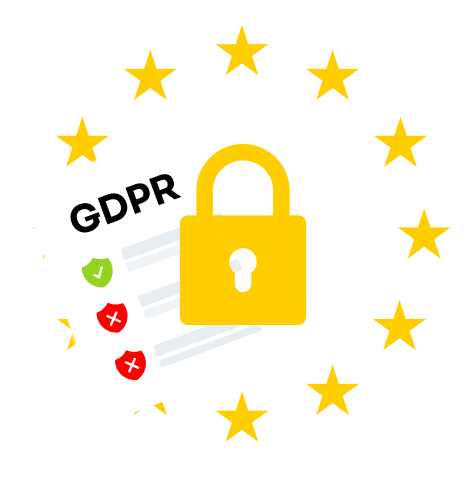Introduction
The General Data Protection Regulation (GDPR), which the European Union (EU) implemented in May 2018, has had a significant impact on data protection laws worldwide. Organizations that process the personal data of EU citizens are required to comply with GDPR or face substantial penalties. This article delves into the main risks linked to non-compliance, the GDPR requirements that businesses need to adhere to, and strategies for mitigating potential consequences.
Understanding GDPR and Its Impact on Data Protection
The GDPR is the EU’s framework for safeguarding personal data, ensuring that organizations respect the privacy and rights of individuals. It regulates how companies collect, store, process, and manage data, providing a robust legal structure for data protection. GDPR applies to all organizations operating within the EU or handling the personal data of EU citizens, regardless of the company’s location.
Failing to comply with GDPR regulations can result in severe administrative fines, legal action, and significant reputational damage. The regulation mandates that organizations implement appropriate security measures to protect personal data and demonstrate accountability. Understanding GDPR’s impact is essential for companies to avoid non-compliance risks.
GDPR Compliance: Why It’s Critical for Organizations
For organizations that process personal data, GDPR compliance is crucial. It ensures that companies handle personal information responsibly and securely. Companies must appoint a Data Protection Officer (DPO) to oversee data protection strategies, especially if they process large volumes of sensitive data, such as biometric data or health records.
Non-compliance can lead to hefty fines imposed by Data Protection Authorities (DPAs), often based on the severity of the GDPR infringement. In some cases, penalties can amount to 4% of a company’s annual global turnover or €20 million, whichever is higher. These fines are not only financially damaging but also erode consumer trust, making GDPR compliance a critical business obligation.
The Role of Data Controllers and Processors in Compliance
Under GDPR, both data controllers and data processors have distinct responsibilities. A data controller determines the purposes and means of processing personal data, while a data processor handles the data on behalf of the controller. Both entities must ensure compliance by implementing organizational measures that mitigate security risks and uphold data privacy.
Data controllers must provide clear language when requesting consent from data subjects, ensuring individuals are fully informed about how their data will be processed. Processors, on the other hand, are responsible for implementing appropriate security measures to safeguard the data during processing operations. Non-compliance by either party can lead to GDPR violations and legal consequences.

Protecting Personal Data and Preventing Data Breaches
Protecting personal data is at the core of GDPR regulations. Organizations must take proactive steps to secure sensitive data, including financial information, health records, and biometric data. This involves conducting a Data Protection Impact Assessment (DPIA) when processing data that could result in a high risk to the rights and freedoms of individuals.
Data breaches, which involve unauthorized access, disclosure, or loss of personal data, must be reported to Data Protection Authorities within 72 hours. Failure to do so can result in hefty fines and legal repercussions. Non-compliance in reporting data breaches can also lead to further scrutiny from regulatory bodies, increasing the risk of more severe penalties.
Data Collection and Lawful Basis for Processing
Organizations must have a lawful basis for processing personal data under GDPR. There are six lawful bases, including the individual’s consent, contractual necessity, legal obligations, vital interests, public tasks, and legitimate interests. Processing data without a lawful basis constitutes a violation of GDPR requirements, exposing companies to significant risks.
Additionally, companies must limit data collection to what is necessary for the specific purpose. Collecting excessive data without a valid reason could lead to GDPR violations. It is essential to review data processing practices to ensure compliance with lawful basis requirements and avoid fines imposed for non-compliance.
Sensitive Data and Special Categories of Data
GDPR places strict conditions on processing sensitive data, also known as special categories of data. This includes information about an individual’s racial or ethnic origin, political opinions, religious beliefs, health, or biometric data used for identification purposes. Organizations must implement enhanced security measures to protect this sensitive data.
Processing sensitive data without proper safeguards or a lawful basis could lead to severe penalties. Organizations must ensure they have specific consent from data subjects or a legal justification before handling such data. Failing to comply with these requirements could result in substantial GDPR fines and legal challenges.
Cyber Threats and Data Security Risks
Cyber threats pose a significant risk to GDPR compliance, as they can lead to data breaches, theft, or loss of personal data. Organizations must implement robust security measures, including encryption, access controls, and regular audits, to safeguard data from cyber-attacks.
GDPR requires companies to take both organizational and technical measures to mitigate risks. This includes training employees to recognize and respond to cyber threats and ensuring that everyone in the organization understands their role in protecting personal data. Failing to address these risks can result in non-compliance and costly penalties.

Consequences of Non-Compliance: Fines and Reputational Damage
GDPR non-compliance can result in severe financial penalties. Administrative fines are determined based on the severity of the infringement, the organization’s intent, and the damage suffered by data subjects. In extreme cases, companies can face penalties of up to €20 million or 4% of their global revenue, whichever is higher.
Beyond financial losses, GDPR violations can lead to irreparable reputational damage. Consumers are becoming increasingly conscious of their data privacy rights, and companies that do not safeguard personal data risk losing the trust of their customers. This reputational damage can have long-lasting consequences for businesses, including loss of customers, legal actions, and reduced revenue.
Data Protection Authorities: Enforcement and Oversight
Data Protection Authorities (DPAs) play a crucial role in enforcing GDPR regulations. They are responsible for investigating complaints, conducting audits, and imposing penalties for non-compliance. DPAs have the authority to issue warnings, reprimands, or enforce fines for companies that violate GDPR requirements.
Organizations must cooperate with DPAs during investigations and comply with their guidance. Regular audits by DPAs ensure that companies adhere to GDPR standards and implement the necessary measures to protect personal data. Non-compliance during audits or investigations can lead to heightened scrutiny and more severe fines.
Data Protection Officers and Their Role in Compliance
Appointing a Data Protection Officer (DPO) is mandatory for certain organizations under GDPR, particularly those that process large volumes of sensitive data or engage in high-risk data processing activities. The DPO is responsible for monitoring GDPR compliance, advising on data protection matters, and acting as a liaison between the company and DPAs.
A DPO plays a critical role in ensuring that a company complies with GDPR regulations. They conduct regular audits, provide guidance to employees, and oversee data protection impact assessments. Companies that fail to appoint a DPO when required risk non-compliance and potential fines.
Data Protection Impact Assessment (DPIA) for High-Risk Processing
A Data Protection Impact Assessment (DPIA) is a tool required under GDPR to assess the risks of high-risk data processing operations. DPIAs help identify potential threats to data privacy and ensure that appropriate security measures are implemented to mitigate risks.
Organizations must conduct DPIAs when processing activities are likely to result in a high risk to the rights and freedoms of individuals. Failing to perform a DPIA can lead to non-compliance and potential penalties. DPIAs also serve as a way to demonstrate that organizations are taking steps to protect personal data, which can be crucial in avoiding GDPR infringements.

Organizational and Technical Measures for Data Protection
GDPR requires organizations to put in place both organizational and technical measures to safeguard personal data. Organizational measures include policies, training employees, and establishing internal processes to manage data securely. Technical measures include encryption, access controls, and regular system audits.
Implementing these measures is essential for GDPR compliance and helps mitigate the risk of data breaches or cyber threats. Organizations that fail to implement sufficient safeguards risk non-compliance and may face fines imposed by regulatory authorities.
Repercussions of GDPR Violations on E-Commerce Businesses
E-commerce businesses, particularly those that handle large amounts of personal data, are at significant risk if they fail to comply with GDPR. These companies often rely on data collection for marketing, customer service, and personalization, making them prime targets for data breaches and GDPR violations.
For e-commerce companies, ensuring that they have a lawful basis for processing customer data and obtaining clear, informed consent is vital. Failure to comply with these rules can result in fines and a loss of consumer trust, potentially damaging the business’s reputation and revenue streams.
Best Practices for Ensuring GDPR Compliance
To avoid the risks of non-compliance, companies must implement several best practices. First, a data protection officer (DPO) should be appointed where necessary to oversee data protection strategies. Conduct regular audits and Data Protection Impact Assessments (DPIAs) to identify potential risks and address them proactively.
Training employees on GDPR requirements and data privacy policies is also essential. Employees must be aware of how to handle data securely and recognize potential cyber threats. Ensuring that all data processing activities have a lawful basis and are conducted transparently will help companies remain GDPR compliant and avoid potential fines and reputational damage.

Conclusion
Ensuring compliance with the General Data Protection Regulation (GDPR) is crucial for any organization that deals with personal data, especially within the European Union. Failure to comply with the GDPR can result in significant financial repercussions, legal consequences, and harm to a company’s reputation. To effectively adhere to the GDPR requirements, businesses must thoroughly comprehend the regulations, designate a Data Protection Officer, regularly conduct comprehensive audits, and deploy robust security measures to safeguard personal data.




